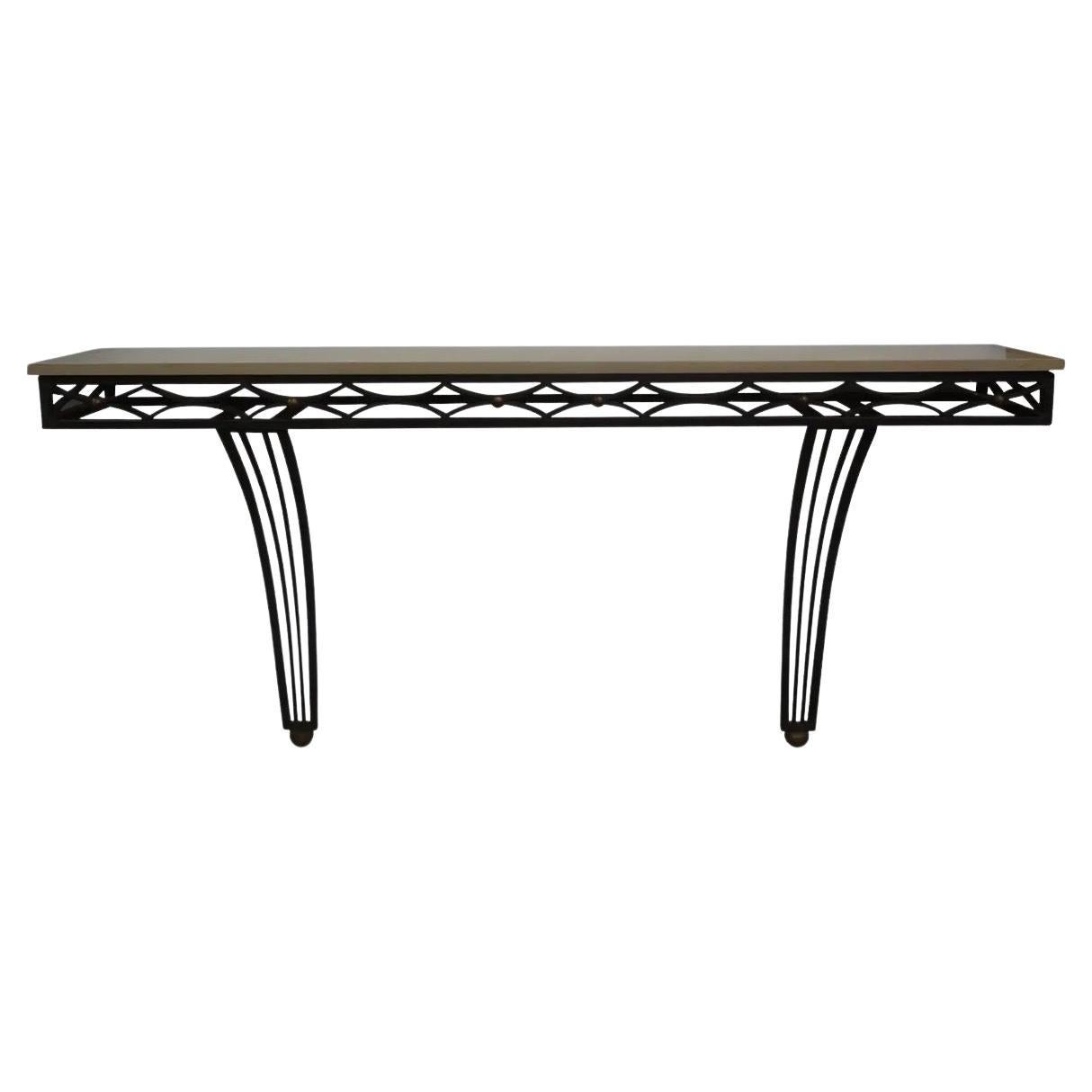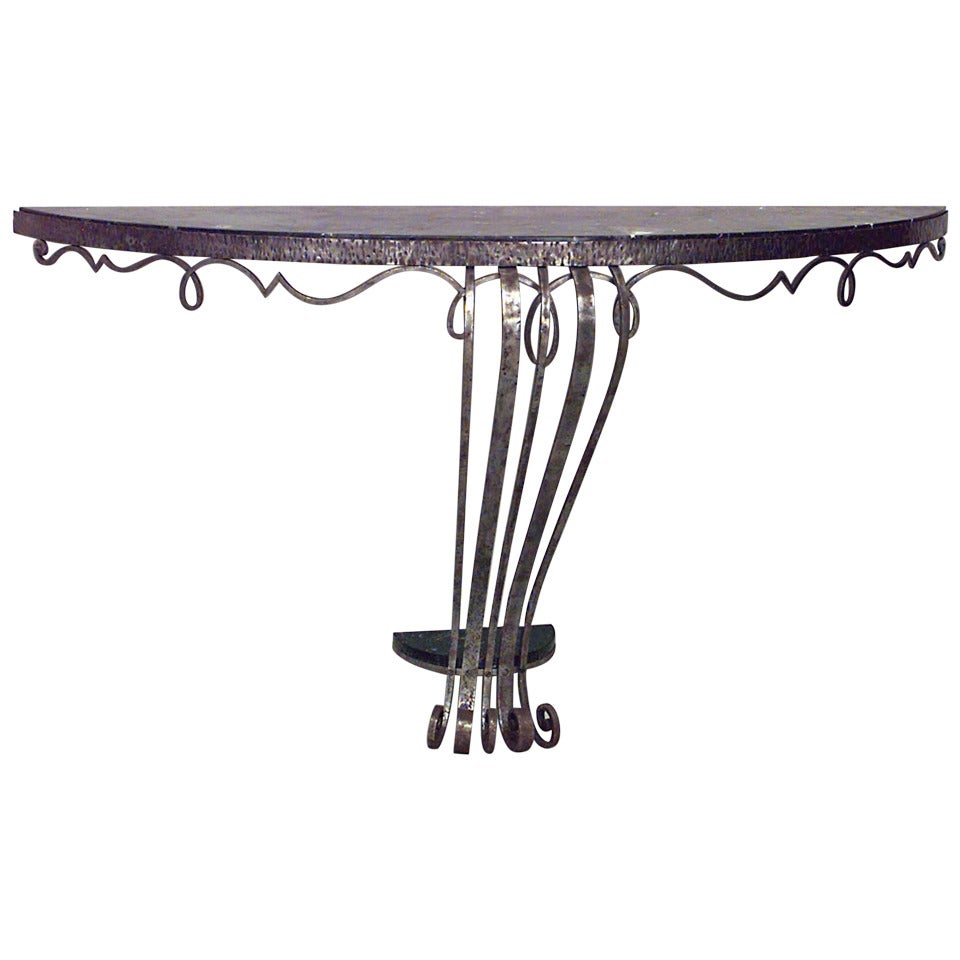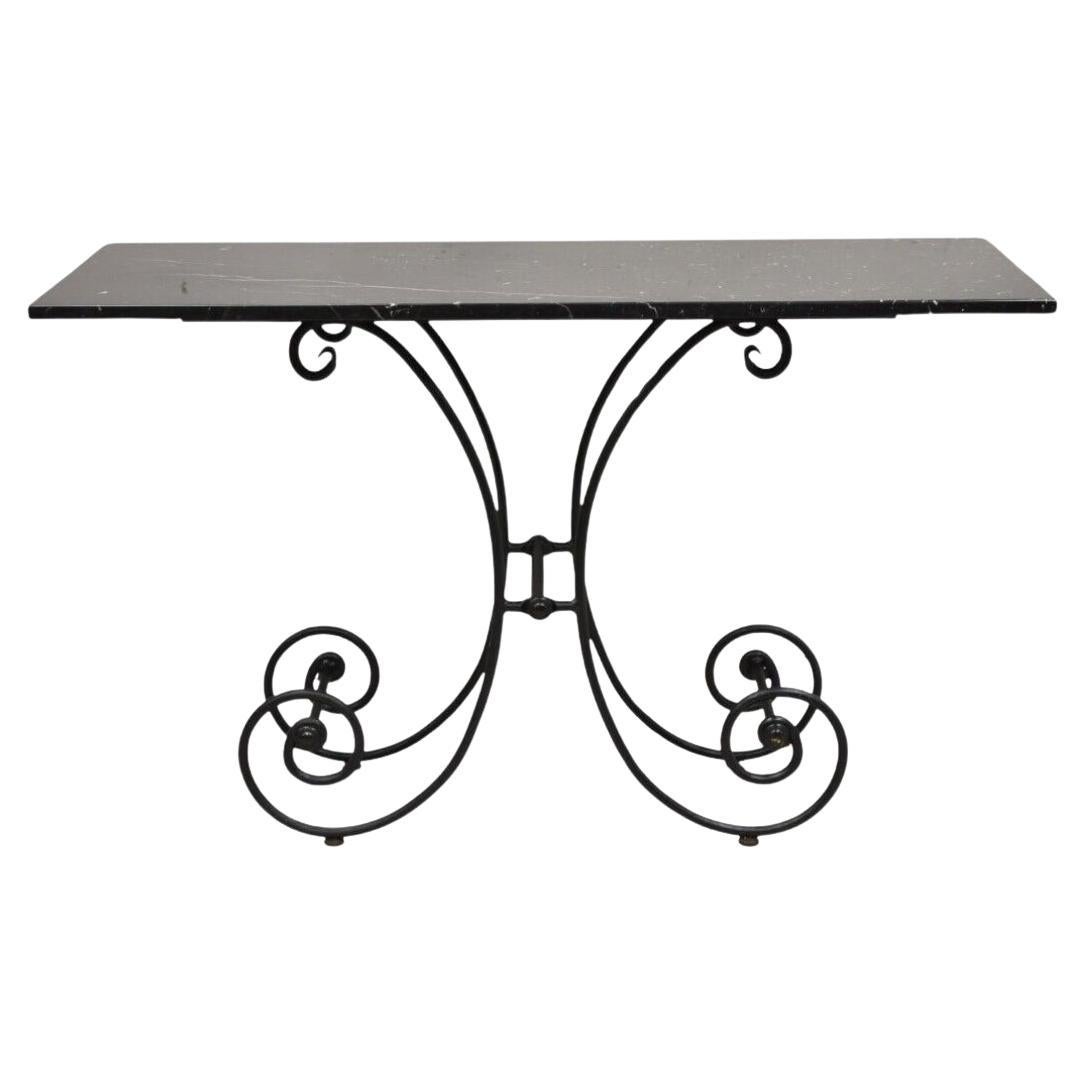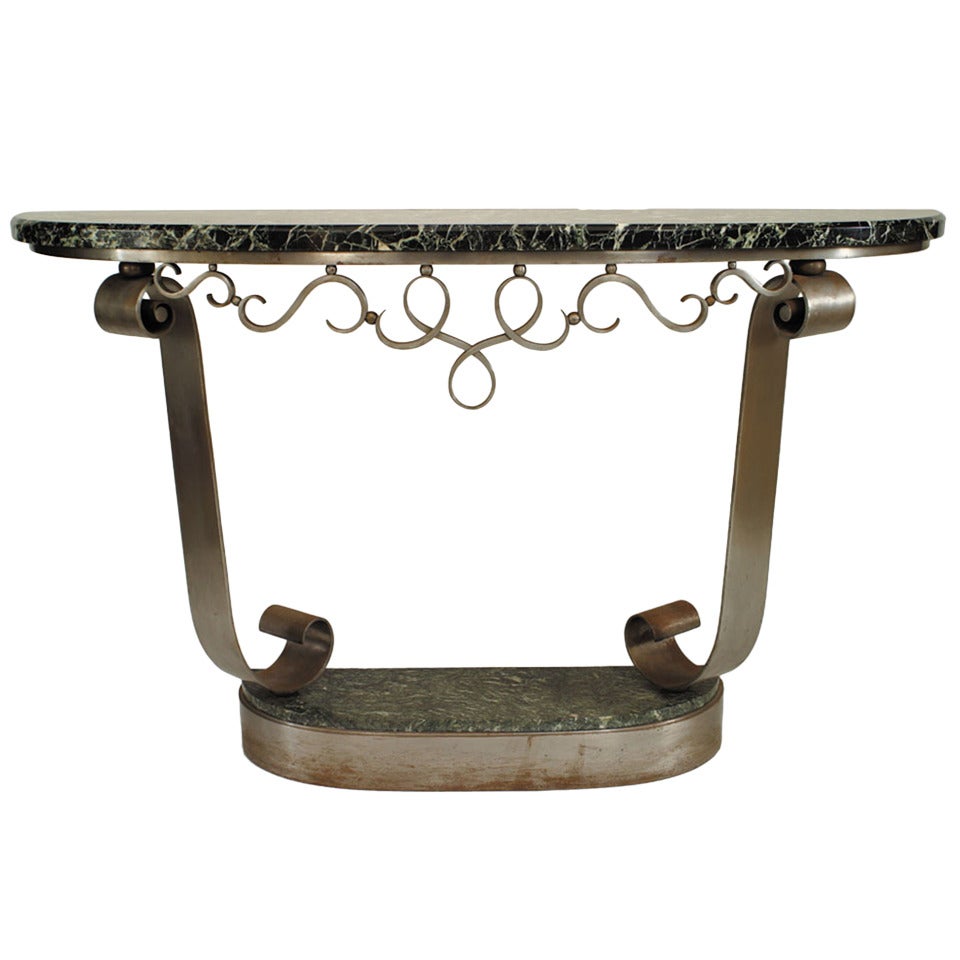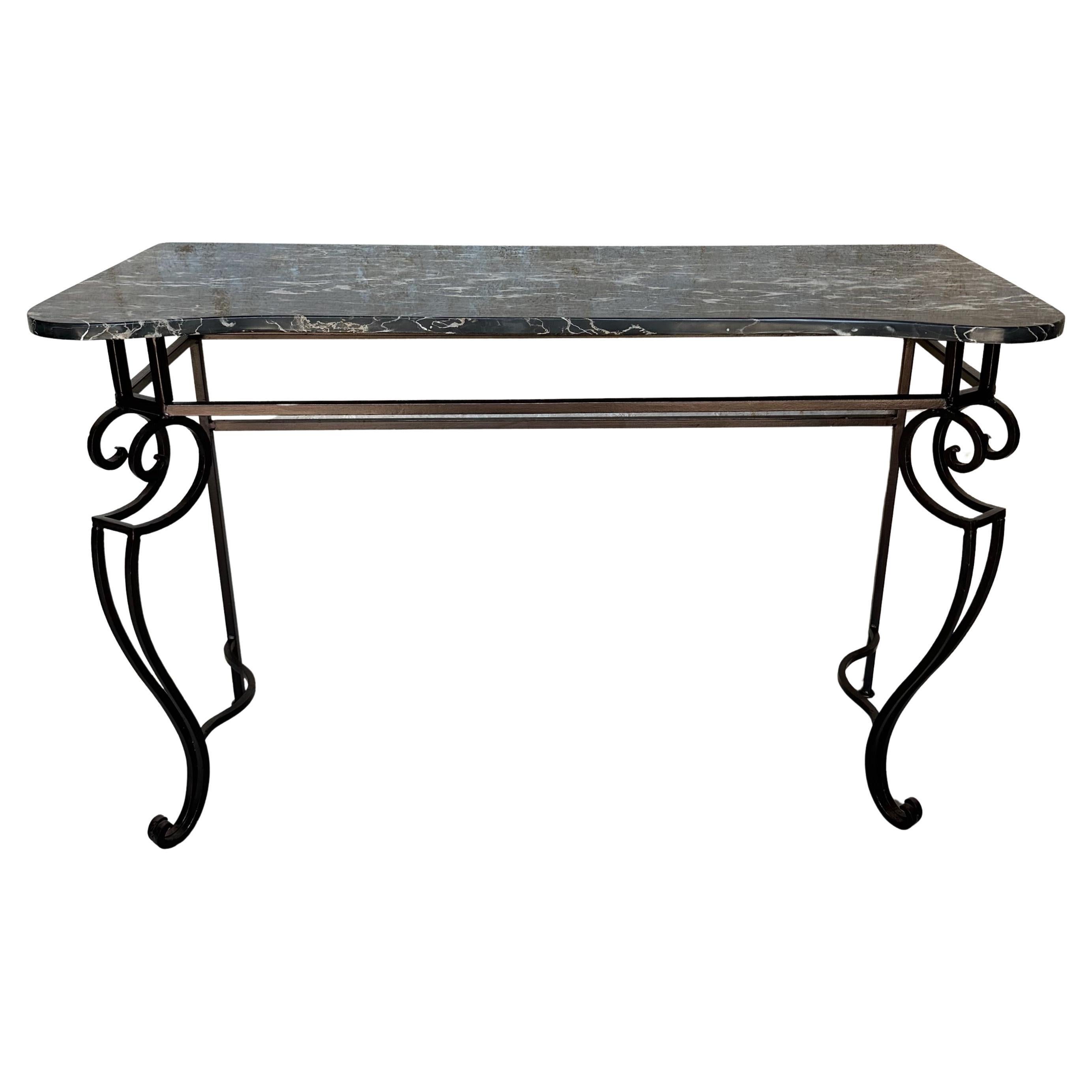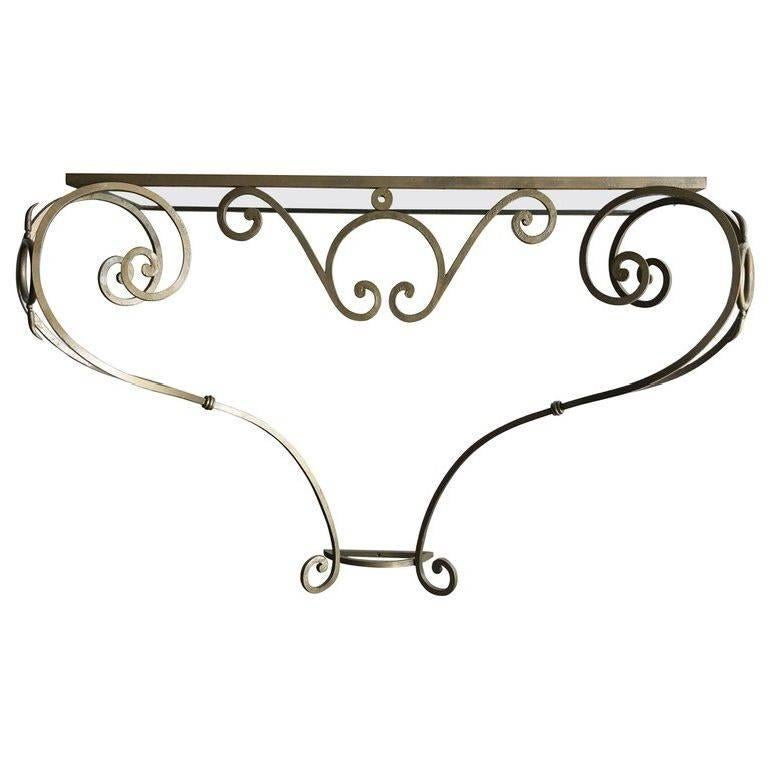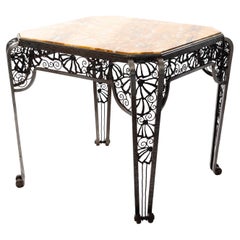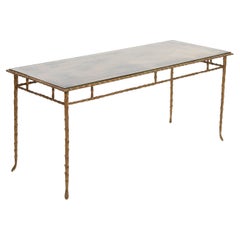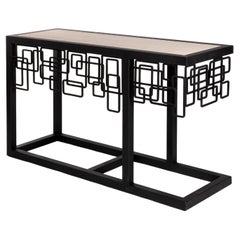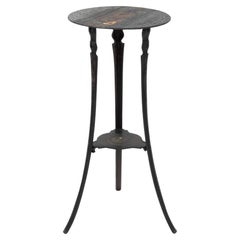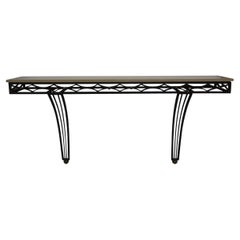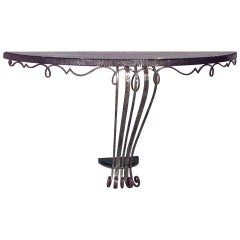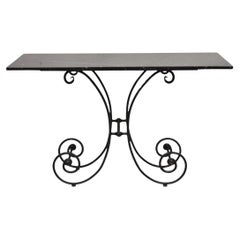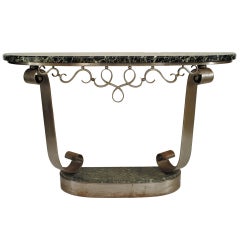Items Similar to French Wrought Iron Art Déco Console Table attributed to Raymond Sybes 1930s
Want more images or videos?
Request additional images or videos from the seller
1 of 13
French Wrought Iron Art Déco Console Table attributed to Raymond Sybes 1930s
$11,510.32
£8,787.72
€9,800
CA$16,251.74
A$17,834.26
CHF 9,314.92
MX$213,228.43
NOK 117,990
SEK 110,047.88
DKK 74,656.11
About the Item
Fantastic wrought iron Art Deco console table that stands out thanks to its striking yet clean lines.
The outer columns have an elegant curve that meets on a rectangular, solid base.
The
Raymond Henri Subes (13 April 1891 – 31 January 1970) was a French decorative artist specializing in ironwork.
Generally associated with the Art Deco movement, he has been referred to as one of the greatest French ironworkers of the 20th century.
Raymond Subes was born 1891 in Paris of Jacques Subes (1857–1929) and his wife Marie, née Bouiges (1859–1936).
He studied at École Boulle from 1906 to 1910, graduating top of his class, then briefly at École nationale supérieure des arts décoratifs under architect Charles Genuys. In 1911 he became a draughtsman for Émile Robert a pioneer of the revival of artisanal ironworking after decades of dominance of industrial cast iron products, who had just cofounded the Borderel & Robert company in Paris together with industrialist Ernest Borderel.
During World War I, Subes served in light infantry, was wounded on 24 August 1914 at Audun-le-Roman, and was awarded the Croix de Guerre and Médaille militaire for having rescued his wounded captain.
He was wounded again and demobilized in 1916.
From then, Subes worked in a workshop that Émile Robert had established in Enghien-les-Bains near Paris, where he acquired his metalworking skills. He married Adrienne Valadié (1895–1963). They had three children, André (1921–1985), Jacques (1924–2002), and Anne-Marie (who married visual artist Yves Millecamps.
In 1919 Subes replaced Émile Robert as artistic director of Borderel & Robert, and rose to chief executive (French: administrateur délégué) after Robert's death in 1924. He also took a professorship at the École Boulle.
Metalwork created by Subes in the early 1930s (top) above lacquered doors by Max Ingrand at the Tokyo residence of Prince Yasuhiko Asaka, lately Teien Art Museum.
Metalwork created by Subes for a building at 5, avenue Emile-Acollas in Paris
Six medallions created by Subes in 1935 for the SS Normandie, repurposed in 1946 at Our Lady of Lebanon Maronite Cathedral (Brooklyn)[
Subes left most of his creations unsigned, but became highly recognized for his unique and elegant design style, often inspired by calligraphy. He worked primarily with wrought iron but also bronze, copper, and starting in the 1930s also aluminum, weathering steel and galvanized steel.
He worked together with some of the greatest architects and decorators of his time such as Jean Dunand, Jules Leleu, Jean Mayodon, and Michel Roux-Spitz. He produced works for the International Exhibition of Modern Decorative and Industrial Arts in 1925, jointly with Émile-Jacques Ruhlmann. For the International Exhibition of 1937, he designed the monumental sliding door of the pavillon du métal, which like most pavilions was demolished after the end of the exhibition. Industrialist Marcel Bloch, founder of Dassault Aviation, purchased the door and had it cut into two unequal pieces: the larger one now adorns Dassault Aviation's head office in Saint-Cloud, on the site where Bloch established a propeller plant in 1938, and the smaller piece is at the Dassault plant in Mérignac, Gironde.
- Attributed to:Raymond Subes (Metalworker)
- Dimensions:Height: 33.47 in (85 cm)Width: 15.75 in (40 cm)Depth: 40.16 in (102 cm)
- Style:Art Deco (Of the Period)
- Materials and Techniques:
- Place of Origin:
- Period:
- Date of Manufacture:1930
- Condition:
- Seller Location:Salzburg, AT
- Reference Number:1stDibs: LU2438346187122

About the Seller
5.0
Gold Seller
Premium sellers maintaining a 4.3+ rating and 24-hour response times
Established in 2000
1stDibs seller since 2016
97 sales on 1stDibs
Typical response time: 1 hour
- ShippingRetrieving quote...Shipping from: Salzburg, Austria
- Return Policy
More From This Seller
View AllFrench Forged Iron Art Déco Center Table by Malatre Et Tonnelier, 1930s
Located in Salzburg, AT
French Art Deco center table in forged iron with mustard colored marble top.
This exceptional table by Malatre et Tonnelier is a handcrafted work of art and an absolute eye-catcher....
Category
Vintage 1930s French Art Deco Center Tables
Materials
Marble, Wrought Iron
$14,651 Sale Price
20% Off
French Mid-Century Bronze Sofa Table in Palm Leave Design by Maison Charles, 60s
By Maison Charles et Fils
Located in Salzburg, AT
French Mid-Century Bronze Sofa Table in Palm Leave Design by Maison Charles, 1960s.
This coffee table in fire gilded bronze shows a very fine frieze of palm leaves all around.
its s...
Category
Vintage 1960s French Hollywood Regency Sofa Tables
Materials
Bronze
Italian Mid-Century Iron/Travertine Console Table Abstract-Geometric Design 70s
Located in Salzburg, AT
Italian Mid-Century Iron/Travertine Console Table Abstract-Geometric Design 70s
Italian Mid-Century Modern solid iron / travertine console table in phantastic abstract, geometric de...
Category
Vintage 1970s Italian Mid-Century Modern Console Tables
Materials
Travertine, Iron
$6,994 Sale Price
20% Off
French Art Nouveau Cast Iron gueridon with Floral Decoration ca. 1900, stamped
Located in Salzburg, AT
French Art Nouveau cast iron gueridon with floral decoration circa 1900, stamped
Extremely elegant and delicate cast iron gueridon with 2 plates on three outwardly curved legs.
The ...
Category
Antique Early 1900s Art Nouveau Gueridon
Materials
Iron
Italian Mid-Century Grazile Iron and Marple Console Table Brass Foot Caps 1950s
Located in Salzburg, AT
Light-footed and elegant Italian mid-century console table with tall brass foot caps and powder-colored marble top.
The console table stands on three round legs (diameter 3 cm) tha...
Category
Vintage 1950s Italian Mid-Century Modern Console Tables
Materials
Marble, Brass, Iron
Mid-Century Italian Chrome - Bronze - Bakelite Console Table by Romeo Rega 1970s
By Romeo Rega
Located in Salzburg, AT
Mid-Century Italian chromed and bronzed console table by Romeo Rega.
Straight design of a modern console table with chromed brass and bronzed brass frame -
Fuchsia colored bakelite ...
Category
Vintage 1970s Italian Mid-Century Modern Console Tables
Materials
Chrome, Bronze
You May Also Like
French Wrought Iron Console Table
By Edgar Brandt, Zadoaisky, Paul Kiss
Located in Houston, TX
French Wrought Iron Console Table.
Stunning large French Art Deco hand forged iron console table with marble top. Our lovely console is a desirable narrow depth perfect for rooms whe...
Category
Vintage 1940s French Art Deco Console Tables
Materials
Marble, Wrought Iron
Raymond Subes French Art Deco Wrought Iron Marble Top Console Table
By Raymond Subes
Located in Queens, NY
French Art Deco wrought iron bracket console table with scroll design front supports & apron with black marble top and small shelf at base (Attributed to RAYMOND SUBES)
Category
Vintage 1930s French Art Deco Console Tables
Materials
Marble, Wrought Iron
Vtg French Country Pastry Style Wrought Iron Marble Top Baker's Console Table
Located in Philadelphia, PA
Vintage French Country Pastry Style Scrolling Wrought Iron Black Marble Top Bakers's Console Table. Circa Early to Mid 20th Century
Measurements: 30" H x 48" W x 18" D.
Category
Early 20th Century French Provincial Console Tables
Materials
Marble, Iron
Raymond Subes French Art Deco Steel and Marble Console Table
By Raymond Subes
Located in Queens, NY
French Art Deco steel console table with a verde antico / green marble top and conforming base joined by scrolling apron & legs (Attribute...
Category
Vintage 1930s French Art Deco Console Tables
Materials
Marble, Steel
French 1940s Wrought Iron Console with Marble
Located in Buchanan, NY
An elegant French iron console with marble from the 1940s. The wrought iron base features intricate scrollwork, recently finished in a deep bronze or black hue, creating a dramatic...
Category
Vintage 1940s French Art Deco Console Tables
Materials
Marble, Iron
$2,720 Sale Price
20% Off
1940 Wrought Iron French Console
Located in Miami, FL
Superb and impressive wrought iron French console.
Category
Vintage 1940s French Mid-Century Modern Console Tables
Materials
Wrought Iron
More Ways To Browse
French Cast Aluminum Dining Table
Art Deco Jules Leleu Dining Table
French Plant Stand With Marble Top
Council Dining Table
Crane Console
Crystal Series Table Acrylic
Dasson Consoles
Denver Console Table
Distressed Mirror Dining Table
Drexel Heritage Sofa Tables
Dripping Console Table
Edgar Brandt Simplicite
Eiffel Console
Emmanuel Pontremoli
Ethan Allen Console Table
Eugene Printz Console
Eugene Prinz
Faux Concrete Console Table
